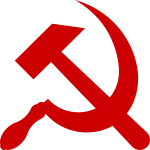New Haitian Communist Party (Marxist–Leninist)
The New Haitian Communist Party (Marxist–Leninist) (French: Nouveau Parti Communiste Haïtien (Marxiste–Léniniste), abbr. NPCH(ML)) is an anti-revisionist Marxist–Leninist communist party in Haiti. It was founded in 2000. In a statement regarding the party's ideological foundation, the NPCH(ML) refers to the theory and practice of Karl Marx, Vladimir Lenin, Mao Zedong and Joseph Stalin.[1]
New Haitian Communist Party (Marxist–Leninist) Nouveau Parti Communiste Haïtien (Marxiste–Léniniste) | |
|---|---|
 | |
| Abbreviation | NPCH(ML) |
| Leader | Vania Lubin |
| Founded | 2000 |
| Headquarters | Port-au-Prince |
| Ideology | |
| Political position | Far-left |
| International affiliation | ICOR |
| Colors | Blue |
| Website | |
| npch | |
The NPCH(ML) participates in and was a founding member of the International Coordination of Revolutionary Parties and Organizations (ICOR).
History
editUnder the regime of Jean-Claude Duvalier and his father François Duvalier, left-wing parties in Haiti were brutally repressed. This led to the exile of the Unified Party of Haitian Communists (PUCH) in France. The PUCH would return to Haiti after Duvalier was overthrown in 1986, but it began to disintegrate shortly afterwards, mostly due to the fall of the Soviet Union in 1991. Former party members of the PUCH and the also defunct Haitian Workers Party met in secret during the military rule of Raoul Cédras in the 1990s, but the political situation made it impossible to form a cohesive party. In 2000, after the end of military rule, the New Haitian Communist Party (Marxist–Leninist) was founded.[2]
Ideology
editThe NPCH(ML) officially espouses Marxism–Leninism. The party wishes to form links with the working class in Haiti, with the goal of educating them on their ideology and spreading a commitment to the proletarian struggle throughout the country.[1][3]
References
edit- ^ a b "Le Parti". NPCH(ML). 7 October 2010. Retrieved 16 September 2016.
- ^ "Le Mouvement Communiste haïtien: La ligne du Temps". NPCH(ML). 31 May 2005. Retrieved 16 September 2016.
- ^ "Qui sommes-nous?". NPCH(ML). 12 December 2002. Retrieved 16 September 2016.